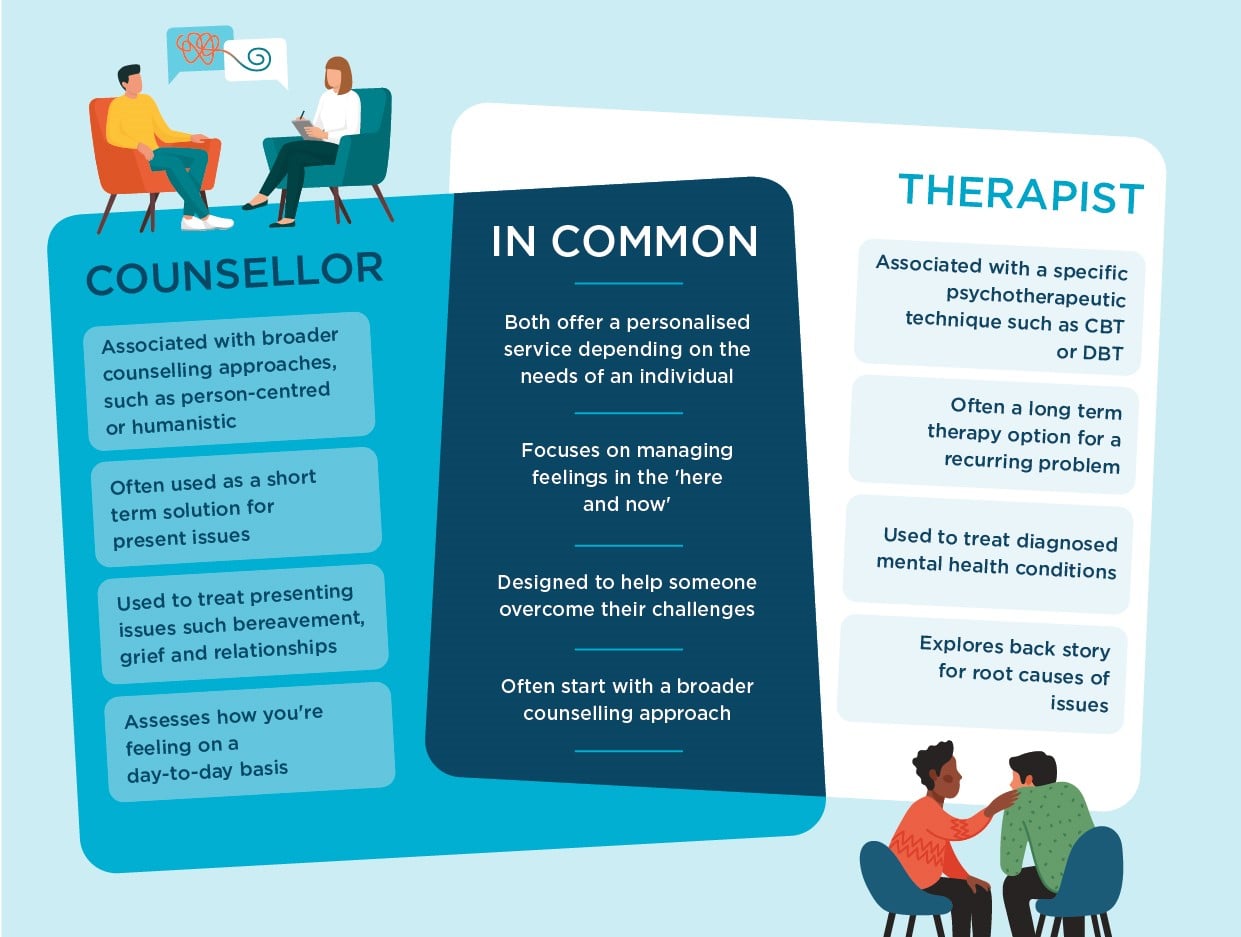The difference between counselling and therapy
Find out the difference between a therapist vs a counsellor, and which may be best placed to help you with your mental health challenges.
The terms ‘counsellor’ and ‘therapist’ are often used interchangeably by organisations, public bodies and people, and there's an ongoing debate within the field around how and whether these terms can be formally defined and differentiated. In addition, practitioners themselves may use both terms to describe their profession or may simply have a personal preference regarding which term they use to describe their practice. It’s important to note that neither of these approaches are incorrect.
Ultimately, both types of professionals are there to help people work through their mental health problems and aid mental health recovery. However, there are some individual features of counselling and therapy, that may be considered to be differences between the two.

There are many types of therapy and counselling techniques a specialist may take interest in. Counselling is usually associated with broader counselling approaches and counsellors may receive training within one or a number of these wider approaches. These approaches include:
On the other hand, therapy may be more commonly associated with specific psychotherapeutic techniques, such as:
Therapists may have specialised in using a specific therapeutic technique (for example, CBT) and therefore, may label themselves specifically as a cognitive behavioural therapist, for example.
Therapy may be more likely than counselling to be used to treat diagnosed mental health conditions such as depression, anxiety, post-traumatic stress disorder (PTSD) and obsessive compulsive disorder (OCD). This is because therapy is evidence-based and formulation-driven, and in many cases, has been specifically designed to treat certain mental illnesses.
On the other hand, counselling may be more commonly used to treat other presenting issues that aren’t necessarily diagnosed mental illnesses. These might include things like bereavement and grief counselling, relationship counselling, building coping strategies, and support with other issues such as low self-esteem. These issues may be considered to be related to the general ‘ups and downs’ of life, although this isn’t to say that they're any less significant than formal mental health conditions.
In counselling, you’re more likely to focus on the short-term ‘here and now’ and find ways to manage your current issues and feelings. Your counsellor will typically assess how you’re feeling in the present moment and how this is affecting your wellbeing on a day-to-day basis.

During therapy, as well as having an awareness of the ‘here and now’, you’re also more likely to explore the ‘back story’ to your problems, in order to get to the root cause of these. This will enable you to understand how your past experiences may have influenced the way you’re feeling, challenge the way you respond to these, and move forwards.
It could be said that most practitioners in the field start off with a broader counselling approach as their initial training. They may then add further, more focused training to their skillset, which may include psychotherapy training such as CBT, DBT, or the other approaches mentioned above. At this point, they may begin to identify themselves as more of a therapist or psychotherapist.
Therefore, a therapist may have undertaken more technique-specific training than a counsellor, but that’s not to say they have better experience than a counsellor – it’s simply more likely to be focused in a certain area or areas.
When it comes to deciding whether you should see a therapist or a counsellor, ultimately, the most important factor to look for is whether the person is appropriately trained and adheres to codes of ethics and professional boundaries. At Priory, we employ registered and accredited counsellors and therapists across the UK, and we ensure that each and every one of these professionals meet this criteria.
In regards to your specific needs and the condition/issues you’re struggling with, our friendly team will be able to find out more information about what you’re going through and use this to advise on the most appropriate specialist for your needs.
Ultimately, if you’re struggling with your mental health or would like to talk to a professional about things that are going on in your life, it’s really important that you get support. At Priory, whether you see a therapist or a counsellor, we have the expertise to help you overcome your issues and get back on track.